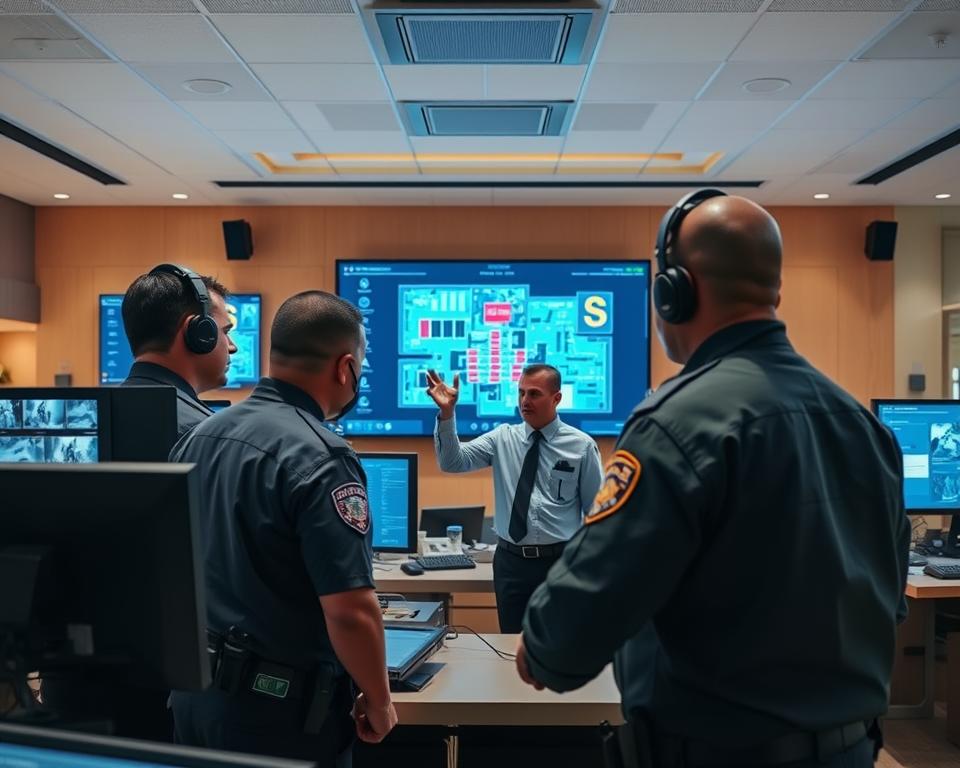Optimizing Protection with Hospital Security Guards
Did you know that hospitals face an average of 30 violent incidents daily? This eye-opening number points to the indispensable part played by Hospital Security Guards. They secure patients, employees, and sensitive information. In the rapidly evolving health sector, strong Healthcare Facility Security is paramount. It involves establishing secure environments where patients receive care free from violence or privacy risks.
Aligning with veteran agencies like Divine Protection Services improves Medical Center Security Services. This guarantees that security remains foremost while maintaining accessibility. This piece explores how security guard solutions and monitoring systems can greatly enhance safety measures. It covers threats from within and beyond effectively.

Summary Points
- Hospital Security Guards are essential for safeguarding patients, personnel, and confidential information.
- Healthcare Facility Security is key to preventing violence and securing privacy.
- Unified security platforms improve the total impact of medical center protection services.
- Aligning with organizations like Divine Protection Services provides bespoke security solutions.
- State-of-the-art technologies are the foundation of present-day healthcare security solutions.
- Juxtaposing access and confidentiality is essential for robust hospital safety protocols.
Why Hospital Security Matters
Hospital security is vital for protecting patients, employees, and private information. The rise in violence in medical settings highlights the need for strong Hospital Security Guards. Such guards are crucial for sustaining a protected atmosphere and preserving the rights and dignity of all.
Enforcing robust Healthcare Facility Security plans is fundamental to stop violent behavior. This assists in fostering a caring atmosphere, enhancing the experience for patients and families. It additionally secures conformity with rules such as HIPAA, enforcing secure access to safeguard Protected Health Information (PHI). Such measures not only safeguard patients but also foster trust between healthcare providers and their communities.
| Category of Security Intervention | Importance | Regulatory Conformity |
|---|---|---|
| Access Control Systems | Limit unapproved entry and permissions | Essential for HIPAA compliance |
| Surveillance Cameras | Observe events and prevent illicit acts | Aligns with rules for secure environments |
| Emergency Response Plans | Provide quick responses to incidents | Compliant with safety and emergency management guidelines |
| Training for Security Personnel | Prepare personnel with crisis management abilities | Guarantees adherence to security standards |
Putting funds into solid security systems and staff training is critical for defending hospitals and healthcare environments. These frameworks establish a secure, compliant environment, fundamental for delivering quality care to patients.
Duties of Hospital Security Guards
Hospital security officers serve a crucial function in maintaining safety within medical centers. They guard access ways to block unapproved entry, respond to crises, and apply conflict management to forestall risks. After receiving instruction from Divine Protection Services, they detect and handle signs of aggression or unrest.
Their role is essential in upholding the safety and welfare of patients and personnel. They defend the facility’s operations, necessary for a restorative environment. By delivering security, they enrich patient care and lower risks.
High-Tech Tools for Hospital Security
Modern healthcare environments increasingly rely on Advanced Technologies to bolster security measures. Medical Center Security Services adeptly incorporate AI-powered cameras to elevate monitoring efficiency. Such cameras provide live tracking and analytics, allowing teams to detect and address risks promptly.
A fundamental part of Healthcare Security Solutions is utilizing access control systems. These solutions confine entry to restricted areas, ensuring that only sanctioned personnel can access crucial sections. By leveraging biometric authentication, medical centers can integrate extra security around patient data and vital medical apparatus.
AI-enhanced security systems are fundamental to physical protection. Face recognition and behavior analysis allow security teams to react quickly to security incidents. High-level video analytics aids in operational choices, offering nonstop monitoring of hospital premises. This contributes to a protected setting for staff and patients alike.
| Tech Tool | Application | Benefits |
|---|---|---|
| AI-driven Surveillance | Live tracking | Rapid hazard recognition |
| Access Control Systems | Restricted entry | Guarding important sections |
| Facial Recognition | Biometric verification | Preventing unauthorized access |
| Video Analytics | Surveillance management | Insight-based strategies |
Leading Technologies do more than guard hospital resources—they also build a protected atmosphere for all. By allocating resources to these innovative tools, medical centers can stay alert to security risks. This upholds superior patient care standards.
Hospital Security Approaches
Successful Healthcare Facility Security plans are critical to protect patients, employees, and guests in hospitals. Conducting thorough security risk assessments is the cornerstone of these strategies. By identifying vulnerabilities, healthcare facilities can craft specific protocols for various scenarios. This improves their readiness for whatever incidents may arise.
It’s important to foster the reporting of abnormal behaviors and threats. Hospitals should maintain processes to address such notifications promptly. This anticipatory position in Healthcare Facility Security builds a community-wide safety mindset.
Managing visitors is a key component of Medical Center Security Services. Making sure that only permitted persons gain entry preserves a safe setting. Watching over patient-caregiver interactions helps diminish risks. This creates a safer space for all. Presented below is a table detailing the main elements of successful security strategies.
| Security Component | Overview | Outcomes |
|---|---|---|
| Risk Assessments | Spotting weaknesses and evaluating potential hazards. | Improves preparedness and response times. |
| Incident Reporting | Urging the community to disclose suspicious incidents. | Supports quick reactions to dangers and boosts awareness. |
| Visitor Management | Guidelines for supervising and restricting access to sites. | Improves protection and lowers unauthorized entry. |
| Staff Training | Ensuring staff receive comprehensive security training. | Arms employees with skills for responding to security situations. |
Preparing Security Personnel Competently
Effective training for healthcare security personnel is key to maintaining safety in hospitals. Continuous education helps staff adapt to new challenges. It also boosts their ability to respond well in different situations.
‘Divine Protection Services’ emphasizes developing strong situational awareness in security personnel. This covers gaining conflict-handling skills for high-pressure situations. Consistent practice drills and role-play exercises reinforce policies. Employees develop skills to tackle threats promptly while safeguarding dignity and respect.
This training strategy for security teams extends past basic defense techniques. It fosters a culture of safety and professionalism in healthcare facilities. By emphasizing essential skills, medical centers guarantee their security staff can face threats competently.
Conforming to Regulatory Criteria
Adhering to Regulatory Standards is critical for medical centers striving for safety and credibility. For example, HIPAA mandates stringent access controls to safeguard Patient Health Information (PHI). These procedures stop unapproved access and guard against data leaks.
Medical centers can enhance their compliance by implementing comprehensive policies. They involve recurring reviews, personnel instruction, and transparent incident notification procedures. These steps not only ensure patient well-being but also foster community confidence.
Companies like Divine Protection Services offer specialized compliance strategies for healthcare facilities. Their knowledge in Hospital Security Services guarantees that security staff are properly prepared to adhere to regulations.
Commitment to compliance reduces risks and builds a strong patient-provider relationship. A proactive view on regulations aids the entire healthcare infrastructure.
Hospital Security Guards in Action
Hospital Security Officers are vital in keeping healthcare facilities safe. Their efforts appear in numerous practical scenarios, showcasing their anticipatory methods. For instance, they oversee disputes in waiting rooms, swiftly settling them to avert escalation.
In tense moments, these officers escort individuals to safe places, supporting them in their time of need. This measure shields those at risk and preserves a peaceful setting. Their partnership with law enforcement during emergencies highlights the significance of Professional Healthcare Security. They usually function as the primary responders.
Education provided by Divine Protection Services trains these guards to respond to emergencies adeptly. They gain abilities to implement rules while safeguarding everyone’s dignity. This mix of command and empathy positions them as essential parts of the healthcare team. They commit to ensuring security and protection for everyone on site.
Adapting Security Solutions for Hospitals
Healthcare facilities face unique security challenges that demand a tailored approach. Personalizing Security Solutions is crucial for meeting these challenges, creating a protected space for patients and staff. Collaborating with specialists such as Divine Protection Services allows hospitals to develop security plans tailored to their exact requirements.
A comprehensive security plan addresses essential aspects such as violence deterrence and drug security. Through advanced tech, facilities can enhance their security practices while following HIPAA guidelines. This usually entails visitor management platforms and dynamic access control solutions that adjust to evolving demands.
The duties of Medical Facility Guards are critical as well. They benefit from targeted training to deal with security episodes and ensure sustained vigilance. Their deployment discourages danger and provides peace of mind to staff and patients.
The following table demonstrates how Personalizing Security Solutions tackles diverse healthcare issues:
| Challenge | Custom Solution |
|---|---|
| Violence Prevention | Coaching Medical Facility Guards in calming and negotiation tactics |
| Medication Security | Setting up protected drug cabinets and surveillance solutions |
| Visitor Management | Advanced visitor screening and badge issuance processes |
| Access Control | Flexible access control platforms that adapt to operational demands |
By carefully planning and partnering with the right organizations, healthcare facilities can establish a strong security posture. This stems from Adapting Security Solutions to their distinctive demands. Combining human oversight with technology significantly improves safety, leading to a more secure and efficient healthcare setting.
Final Thoughts
Securing the safety and health of patients, personnel, and confidential data is critical in hospitals. Hospital Security Guards currently leverage state-of-the-art technology and education to address modern dangers. This progression not only protects physical areas but also builds confidence between patients and medical teams.
Adapted Healthcare Security Solutions assist hospitals in remaining at the forefront of the changing security scene. Joining forces with established entities such as Divine Protection Services enables healthcare institutions to tackle safety worries adeptly. By combining staff development with leading-edge technology, hospitals can create a secure atmosphere for healing and care.
The medical field confronts increasing dangers, rendering expert security protocols essential. Healthcare facilities have to implement these evolving approaches to secure their premises and preserve operational integrity.

